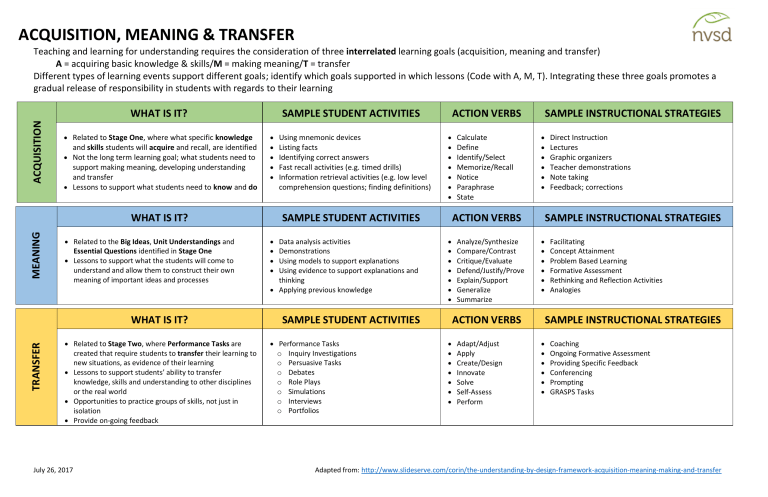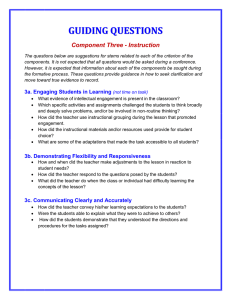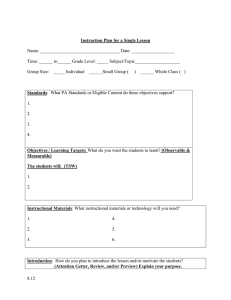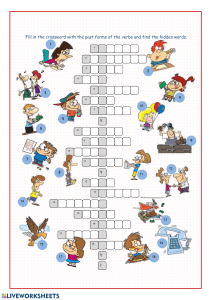
ACQUISITION, MEANING & TRANSFER Teaching and learning for understanding requires the consideration of three interrelated learning goals (acquisition, meaning and transfer) A = acquiring basic knowledge & skills/M = making meaning/T = transfer Different types of learning events support different goals; identify which goals supported in which lessons (Code with A, M, T). Integrating these three goals promotes a gradual release of responsibility in students with regards to their learning ACQUISITION WHAT IS IT? • Related to Stage One, where what specific knowledge and skills students will acquire and recall, are identified • Not the long term learning goal; what students need to support making meaning, developing understanding and transfer • Lessons to support what students need to know and do SAMPLE STUDENT ACTIVITIES • • • • • MEANING WHAT IS IT? • Related to the Big Ideas, Unit Understandings and Essential Questions identified in Stage One • Lessons to support what the students will come to understand and allow them to construct their own meaning of important ideas and processes TRANSFER WHAT IS IT? • Related to Stage Two, where Performance Tasks are created that require students to transfer their learning to new situations, as evidence of their learning • Lessons to support students’ ability to transfer knowledge, skills and understanding to other disciplines or the real world • Opportunities to practice groups of skills, not just in isolation • Provide on-going feedback July 26, 2017 Using mnemonic devices Listing facts Identifying correct answers Fast recall activities (e.g. timed drills) Information retrieval activities (e.g. low level comprehension questions; finding definitions) ACTION VERBS • • • • • • • SAMPLE STUDENT ACTIVITIES • • • • Data analysis activities Demonstrations Using models to support explanations Using evidence to support explanations and thinking • Applying previous knowledge • • • • • • ACTION VERBS • • • • • • • SAMPLE STUDENT ACTIVITIES • Performance Tasks o Inquiry Investigations o Persuasive Tasks o Debates o Role Plays o Simulations o Interviews o Portfolios Calculate Define Identify/Select Memorize/Recall Notice Paraphrase State SAMPLE INSTRUCTIONAL STRATEGIES Analyze/Synthesize Compare/Contrast Critique/Evaluate Defend/Justify/Prove Explain/Support Generalize Summarize SAMPLE INSTRUCTIONAL STRATEGIES • • • • • • ACTION VERBS • • • • • • • Adapt/Adjust Apply Create/Design Innovate Solve Self-Assess Perform Direct Instruction Lectures Graphic organizers Teacher demonstrations Note taking Feedback; corrections Facilitating Concept Attainment Problem Based Learning Formative Assessment Rethinking and Reflection Activities Analogies SAMPLE INSTRUCTIONAL STRATEGIES • • • • • • Coaching Ongoing Formative Assessment Providing Specific Feedback Conferencing Prompting GRASPS Tasks Adapted from: http://www.slideserve.com/corin/the-understanding-by-design-framework-acquisition-meaning-making-and-transfer






